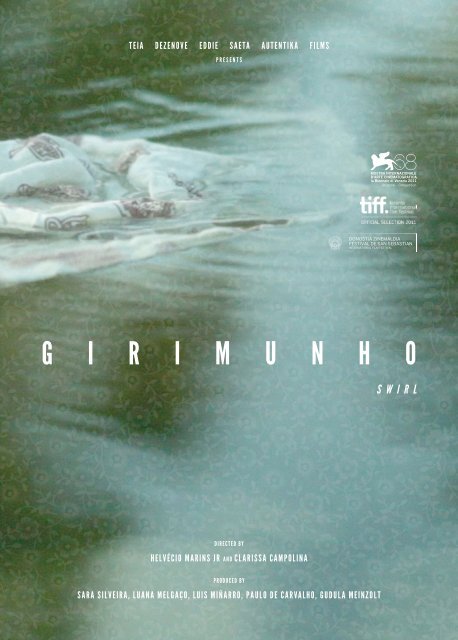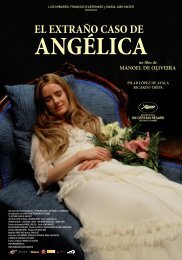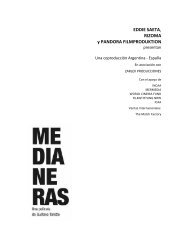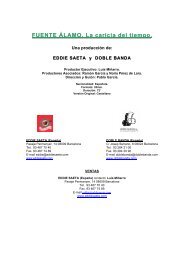Create successful ePaper yourself
Turn your PDF publications into a flip-book with our unique Google optimized e-Paper software.
TEIA DEZENOVE EDDIE SAETA AUTENTIKA FILMSPRESENTSG I R I M U N H OS W I R LDIRECTED BYHELVÉCIO MARINS JR AND CLARISSA CAMPOLINAPRODUCED BYS A R A S I L V E I R A , L U A N A M E L G A Ç O , L U I S M I Ñ A R R O , P A U L O D E C A R V A L H O , G U D U L A M E I N Z O L T
Brazil, Spain, Germany | 2011 | fiction | 90 min | 35mm | colorCREDITSCast: Bastú, Maria do Boi, Preta, Branca, Batatinha, Miltinho, Izadora Fernandes Directed by: Helvécio Marins Jr, Clarissa Campolina Produced by: Sara Silveira, Luana Melgaço, Luis Miñarro, Paulo de Carvalho, Gudula Meinzolt Executive Producers: Luana Melgaço, Maria Ionescu Script: Felipe Bragança Cinematographer: Ivo Lopes Araújo Sound: Gustavo Fioravante Editing: Marina Meliande Sound Design: O Grivo Sound Mixer: Ricard Casals SPONSORSThe following institutions contributed to the funding through grants:• The 4th Filme em Minas – an Audiovisual Production Incentive Program by the Minas Gerais State Culture Secretariat and sponsored by Cemig (Companhia Energética de Minas Gerais) • The Hubert Bals Fund (Project Development and Postproduction): an initiative of the International Film Festival of Rotterdam, 2011, Holland • The Ibermedia Program 2010, Spain • The World Cinema Fund (Postproduction), Berlin International Film Festival – Berlinale 2011
SYNOPSISIn the backlands of Minas Gerais, where time seems to pass at the river’s pace, two elderly women keep the whirlwind of life in full swirl. Bastú has just lost her husband, but tearlessly seeks comfort in daily life and memory. But it is in the freedom of dreams and the freshness brought by her grandchildren that she manages to work her own transformation. Helping her through it is Maria, whose drum pounds with all the joy and power of her people, beating out the sounds of other places and resounding with a presence that can never die. In this world, where tradition is ambushed by novelty and reality by invention, small shifts steep the flow of life in fantasy. GIRIMUNHOThe word “Girimunho”, the film’s title, was presented to us by a child from the Brazilian backlands. Translated into common language, it means ‘swirl’. After the death of her husband, the blacksmith Feliciano, Bastú looks to everyday life and her own memories for the elements that will help her through this upheaval. Accompanying her feelings, her way of seeing the world and of reinventing life, the film follows her transformation in the company of her grandchildren and her friend Maria do Boi, a strong elder whose drum keeps the beat of her people’s traditions. Though centered on the predicament of its main character, the film incessantly strays into other stories unfolding in São Romão, a sleepy little town on the banks of the São Francisco River. A place of searing sun, gnarled tree trunks and stark shadows, the endlessly running waters of the river, the red earth and wasteland feel of the landscape create a setting of arid beauty. Stories, perceptions, beliefs and novelties reveal the transformations of time and the world, allowing the film to roam with all the freedom of a dream, flitting between the reality and the rich oneiric tapestry of the backlands of Minas Gerais. Like Bastú herself, Girimunho is in search of the joyful levity of life. It is a film built of little stories and small shifts capable of steeping the everyday in fantasy.
THE DIRECTORSHelvécio Marins Jr.A post-‐graduate in Cinema, Marins directed the 35mm films “2 Homens”, “Nascente”, “Trecho,” and “Nem marcha nem chouta”. These and other films have collected over 30 awards at Brazilian and international festivals and have made the competitive selections for some of the main events in world cinema, including Locarno, Rotterdam, Venice, Sundance, Toronto, Vila do Conde, Melbourne, Centre George Pompidou and MoMA NY. They have also screened on TV in various countries. Marins produced the feature-‐films “Aboio”, by Marília Rocha, (Best Film at the É Tudo Verdade Film Festival, 2005) “Acidente”, by Cao Guimarães and Pablo Lobato (Best Documentary, Guadalajara, 2008); and “O Céu sobre os ombros”, 2010, by Sergio Borges (winner in the categories of best film, best director and best screenplay at the 43rd Festival de Brasilia, as well as the special prize of the jury). He worked as curator on the International Short Film Festivals in São Paulo and Belo Horizonte and as correspondent for the Locarno Film Festival in Latin America. A collection of his short films is scheduled for a DVD release in September 2011 by Lume Filmes. “Girimunho”, co-‐directed with Clarissa Campolina, is his first feature film as a director. Clarissa CampolinaCLARISSA CAMPOLINA graduated in Social Communication and took a post-‐graduation in the Plastic Arts. She is one of the founding partners of TEIA, an audiovisual research and production center based in Belo Horizonte. Clarissa directed the short film “Trecho” (co-‐directed by Helvécio Marins Jr.), the middle-‐length movie “Notas Flanantes”, the video installation “Rastros – a paisagem invade”, and the short film “Adormecidos”. Her films have won awards in Brazil and abroad and been selected for some of the main events in world cinema, such as the Locarno, Rotterdam, Oberhausen, FIDMarseille, Vila do Conde and Melbourne festivals, among others. Clarissa also edited works of contemporary Brazilian cinema, with special mention for the short film “Agtux”, directed by Tânia Anaya, which was among the prizewinners at the Oberhausen Festival, and the feature films “Acácio” and ”Aboio”, both directed by Marília Rocha, the latter taking the best picture prize at the É Tudo Verdade Festival. “Girimunho”, co-‐directed with Helvécio Marins, is her first feature film as a director.
PRODUCERSTEIAFounded in 2003 in Belo Horizonte, Teia is a center for audiovisual research and production formed by Clarissa Campolina, Helvécio Marins Jr., Leonardo Barcelos, Marília Rocha, Pablo Lobato, Sérgio Borges and Luana Melgaço. The members work collaboratively, combining individual productions and lines of research with others that involve the whole center and specially-‐invited guests. Since its creation, Teia has produced films, videos and installations, and held workshops and exhibitions throughout Brazil and abroad. The center’s films have accumulated over 50 awards at Brazilian festivals, including some of the most important events in the country, such as É Tudo Verdade (Best Brazilian feature film for “Aboio”, 2005), Festival do Rio (ABD&C award for best feature-‐length documentary for “Acidente”, 2006) and Brasília (best short 35mm film for “Trecho” in 2006 and five awards for “O Céu Sobre os Ombros” – Best Film, Best Director, Editing, Screenplay and the special jury’s prize for best cast – in 2010). With extensive participation in international festivals and screenings, Teia has had films selected for such important events as Locarno, Sundance, Rotterdam and Karlovy Vary, and has won awards at Guadalajara (“Acidente”, 2007), Mannheim-‐Heildelberg (“Nascente”, 2006), Alternativa Barcelona (“Nascente”, 2006), Santa Maria da Feira, Portugal (“Silêncio” and “Nascente”, 2005). In addition to shows and festivals, the center and its members have had their films, videos and installations exhibited at the most important art museums in the world, including Centre Georges Pompidou in Paris, MoMA The Museum of Modern Art in New York, the Guggenheim Museum in Bilbao, Film Museum Amsterdam (Holland), the New Museum in New York, and Museu Reina Sofia in Madrid, among others. DEZENOVE SOM E IMAGENSDezenove Som e Imagens was founded by filmmaker Carlos Reichenbach and producer Sara Silveira in 1991, in partnership with Maria Ionescu, with the goal of producing independent short and feature films for the national and international markets. Since then, the company has been producing some of the most memorable Brazilian films. Producing or co-‐producing, with Brazilian or foreign partners, Dezenove has been presenting its films around the world for the past nineteen years. Among its produced films, there are: “Hard Labor”, by Juliana Rojas and Marco Dutra (2011), which has participated in the Un Certain Regard session of Cannes Festival 2011; “The Famous and the Dead”, by Esmir Filho (2010), which attended 2010 Berlin Festival in Generation session and the Official
Competition of Locarno Festival International Film Festival 2009; “Sunstroke”, by Daniela Thomas and Felipe Hirsch (2010), which has participated in the Orizzonti session of Venice Festival; “Cinema, Aspirins and Vultures”, by Marcelo Gomes (2005), which has participated in the Un Certain Regard session of Cannes Festival 2005; “Two Streams”, by Carlos Reichenbach (1999), which has participated in Locarno International Film Festival 1999; among others. EDDIE SAETA<strong>Eddie</strong> <strong>Saeta</strong>, S.A. is an audiovisual production company. It was established and registered in Barcelona in 1989. The producer is Luis Miñarro Albero. Barcelona City Award 2011 The company has produced 22 feature films, more than 400 TV advertisements for different international markets, and several short films and video clips. Among the productions, there are several works of filmmakers like Manoel de Oliveira, Jose Luis Guerin, Marc Recha, Albert Serra, Lisandro Alonso, José María de Orbe and Apichatpong Weerasethakul, with the film "Lung Boonmee raluek chat" that led to Palma Gold in the 63rd edition of the Cannes Film Festival 2010, among others. AUTENTIKA FILMSFilm production company based in Tübingen and Munich, Germany; founded in 2007 by Gudula Meinzolt and Paulo de Carvalho as a platform for their common activities, having been carried out as Mil Colores Media and Cachoeira Films for several years now. Gudula Meinzolt and Paulo de Carvalho merge their knowledge of 20 years of personal experience with the Iberoamerican film as professionals in sectors as promotion, festivals, exhibitions, co-production, international sales and distribution. In cooperation with producers in Peru, Argentina, Brazil, Spain, France, Switzerland and Italy, Gudula Meinzolt and Paulo de Carvalho realized the following projects, fictions as well as documentaries. DIAS DE SANTIAGO by Josué Méndez, (Tiger Awards Rotterdam Film Festival 2004);FILMEFOBIA by Kiko Goifman, (Filmmakers of the present, Locarno Film Festival 2008);PARAÍSO by Héctor Gálvez, Peru (Section Orizzonti, Venice Film Festival 2009);POST MORTEM by Pablo Larraín, Chile (International Competition, Venice Film Festival 2010)
PRODUCERSLUANA M ELGAÇOT ELEPHONE: +55 31 2 127- 4 979FAX: +55 31 2127- 4 9 7 9E - M A IL: LUA NA@T EIA. ART. B RADD R ESS: RUA RIO NEGRO, 8 5 5 , CEP 304 30-4 00, BELO HORIZONTE, MG, BRAZILS A R A SIL VEIR AT ELEPHONE: +55 1 1 3031- 3017FAX: +55 11 3031 -301 7E - M A IL: SARA@DEZ ENOVE.NETADD R ESS: RUA CONDE SILVIO A L V ARES PENTE ADO, 96, PINHEIROS, SÃO PAULO, SPLUIS MIÑARR OT ELEPHONE: +34 9 3 4 677040FAX: +34 93 4677040E - M A IL: EDD IE@ED DIESAETA.COMADD R ESS: PA S A JE PERM ANYER, 1 4, B A R CELONA , SPAIN, 08009P A U L O D E CARV ALHO & GUD U L A MEINZOLTT ELEPHONE: + 4 9 177707 1698 | + 4 9 1609 02004 5 4E - M A IL: INF O@AUTENT IKAF I L MS.C O MADD R ESS: LEM BER GSTR . 52 , 72 0 7 2, T U B INGEN, GERMANYW ORL D SA LES:URB A N D ISTR IBUT ION INTERNA TIONAL14, RUE DU 1 8 A OUT, 93100 MONTREUIL, FRANCEC ONT A C T @URBAND ISTR IB. COM | WW W.UR BANDISTR IB.COMT EL +33 1 4 8 70 4 6 5 5 | FA X +33 1 4 9 72 04 21WWW.SWIRL FILM .COMSWIRL@TEIA.A RT.BRSPEC I A L THANKS T O: A NCINE, M INISTÉR IO D A S REL AÇÕES EXTERIORES, C INEMA DO BRA SIL .SPONSORSPRODUC T ION W O R LD SAL E S SOUND





